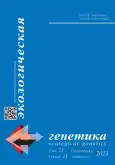Advancing gene editing: multiplex mutagenesis in hexaploid triticale
- Authors: Miroshnichenko D.N.1, Timerbaev V.R.1, Divashuk M.G.1, Pushin A.S.1, Alekseeva V.1, Kroupin P.Y.1, Bazhenov M.S.1, Samarina M.A.1, Ermolaev A.1, Karlov G.1, Dolgov S.V.1
-
Affiliations:
- All-Russia Research Institute of Agricultural Biotechnology
- Issue: Vol 21 (2023): Спецвыпуск
- Pages: 26-27
- Section: Genetically modified organism. The Нistory, Achivements, Social and Environmental Riscs
- Submitted: 20.08.2023
- Accepted: 30.08.2023
- Published: 04.12.2023
- URL: https://journals.eco-vector.com/ecolgenet/article/view/568624
- DOI: https://doi.org/10.17816/ecogen568624
- ID: 568624
Cite item
Full Text
Abstract
The presence of several sets of chromosomes in polyploid crops is a serious problem for the application of gene and genome editing systems. Efficient CRISPR/Cas-based mutagenesis of series of genes involved in the grain starch biosynthesis of hexaploid triticale has been developed. Triticale (×Triticosecale), is a hybrid of rye (Secale) and wheat (Triticum) and consists of three subgenomes. Four genes were targeted and to ensure efficient editing of all subgenomes, a trio of guide RNAs for each target genes were designed. To enable simultaneous editing of 36 genetic loci at once (three sgRNAs × four genes × three subgenomes), an expression cassette was constructed, assembled as an array of twelve sgRNAs. The polysitron vector was delivered to morphogenic calli using a gene gun [1] together with a vector encoding Cas9 nuclease [2] to induce mutations. A number of transgenic plants of spring and winter triticale carrying both Cas9 and sgRNAs inserts have been generated. The efficiency of native gene editing varied depending on the target gene and sgRNA activity. Using a trio of sgRNAs for each target gene, we successfully mutated all three subgenome copies, thereby modifying seed starch synthesis. It can be expected that the described approach will make an important contribution to the future breeding of polyploid crops to produce various combinations of new genetic alleles encoding desired traits.
The study is supported by Kurchatov Genomics Center of All-Russia Research Institute of Agricultural Biotechnology, agreement No. 075-15-2019-1667.
Keywords
Full Text
The presence of several sets of chromosomes in polyploid crops is a serious problem for the application of gene and genome editing systems. Efficient CRISPR/Cas-based mutagenesis of series of genes involved in the grain starch biosynthesis of hexaploid triticale has been developed. Triticale (×Triticosecale), is a hybrid of rye (Secale) and wheat (Triticum) and consists of three subgenomes. Four genes were targeted and to ensure efficient editing of all subgenomes, a trio of guide RNAs for each target genes were designed. To enable simultaneous editing of 36 genetic loci at once (three sgRNAs × four genes × three subgenomes), an expression cassette was constructed, assembled as an array of twelve sgRNAs. The polysitron vector was delivered to morphogenic calli using a gene gun [1] together with a vector encoding Cas9 nuclease [2] to induce mutations. A number of transgenic plants of spring and winter triticale carrying both Cas9 and sgRNAs inserts have been generated. The efficiency of native gene editing varied depending on the target gene and sgRNA activity. Using a trio of sgRNAs for each target gene, we successfully mutated all three subgenome copies, thereby modifying seed starch synthesis. It can be expected that the described approach will make an important contribution to the future breeding of polyploid crops to produce various combinations of new genetic alleles encoding desired traits.
The study is supported by Kurchatov Genomics Center of All-Russia Research Institute of Agricultural Biotechnology, agreement No. 075-15-2019-1667.
About the authors
Dmitriy N. Miroshnichenko
All-Russia Research Institute of Agricultural Biotechnology
Author for correspondence.
Email: miroshnichenko@bibch.ru
ORCID iD: 0000-0003-3975-7484
Russian Federation, Moscow
Vadim R. Timerbaev
All-Russia Research Institute of Agricultural Biotechnology
Email: timerbaev@gmail.com
ORCID iD: 0000-0002-1253-5235
Russian Federation, Moscow
Mikhail G. Divashuk
All-Russia Research Institute of Agricultural Biotechnology
Email: divashuk@gmail.com
ORCID iD: 0000-0001-6221-3659
Russian Federation, Moscow
Aleksandr S. Pushin
All-Russia Research Institute of Agricultural Biotechnology
Email: aspushin@gmail.com
ORCID iD: 0000-0003-0869-3529
Russian Federation, Moscow
Valeria Alekseeva
All-Russia Research Institute of Agricultural Biotechnology
Email: lera@bibch.ru
Russian Federation, Moscow
Pavel Yu. Kroupin
All-Russia Research Institute of Agricultural Biotechnology
Email: pavelkroupin1985@gmail.com
ORCID iD: 0000-0001-6858-3941
Russian Federation, Moscow
Mikhail S. Bazhenov
All-Russia Research Institute of Agricultural Biotechnology
Email: mikhabazhenov@gmail.com
ORCID iD: 0000-0002-7301-1363
Russian Federation, Moscow
Maria A. Samarina
All-Russia Research Institute of Agricultural Biotechnology
Email: miroshnichenko@bibch.ru
Russian Federation, Moscow
Aleksey Ermolaev
All-Russia Research Institute of Agricultural Biotechnology
Email: ermol-2012@yandex.ru
ORCID iD: 0000-0001-9789-8694
Russian Federation, Moscow
Gennady Karlov
All-Russia Research Institute of Agricultural Biotechnology
Email: karlov@iab.ac.ru
ORCID iD: 0000-0002-9016-103X
Russian Federation, Moscow
Sergey V. Dolgov
All-Russia Research Institute of Agricultural Biotechnology
Email: dolgov@bibch.ru
ORCID iD: 0000-0003-1399-3235
Russian Federation, Moscow
References
- Miroshnichenko D, Klementyeva A, Pushin A. et al. A competence of embryo-derived tissues of tetraploid cultivated wheat species Triticum dicoccum and Triticum timopheevii for efficient and stable transgenesis mediated by particle inflow gun. BMC Plant Biol. 2020; 20(Suppl 1):442. doi: 10.1186/s12870-020-02580-4
- Miroshnichenko D, Timevbaev V, Klementyeva A, et al. CRISPR/Cas9-induced modification of the conservative promoter region of VRN-A1 alters the heading time of hexaploid bread wheat. Front Plant Sci. 2022;13:1048695. doi: 10.3389/fpls.2022.1048695
Supplementary files










